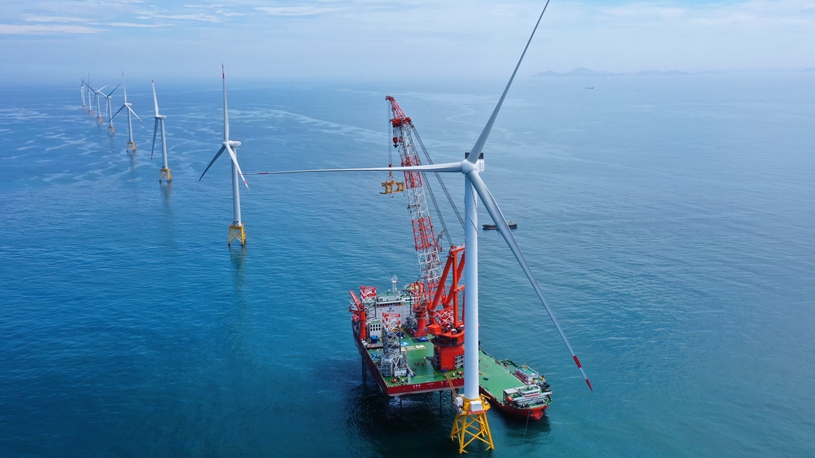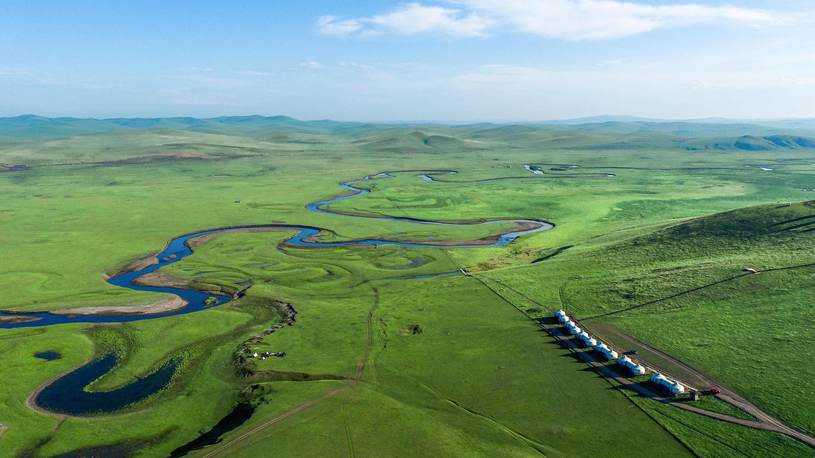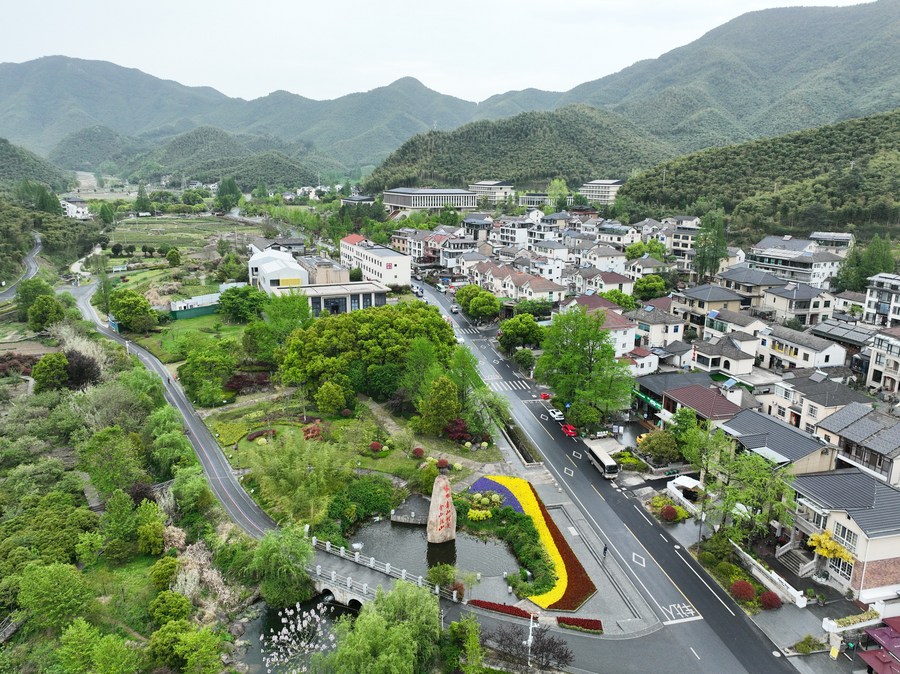
This aerial photo taken on April 13, 2023 shows the Yucun Village in Anji County of Huzhou City, east China's Zhejiang Province. (Xinhua/Weng Xinyang)
BEIJING, July 20 (Xinhua) -- "Lucid waters and lush mountains are invaluable assets" -- this core concept in China's pursuit of ecological progress has not just led to dramatic improvement in the country's environment, but also generated new growth impetus for the world's second largest economy.
As a national conference concluded Tuesday mapped out priorities for China's ecological and environmental protection in the next five years, more advancement is expected to be made in green and low-carbon development, which is key to the country's high-quality development.
From eco-tourism to new-energy industries, localities across China have explored various ways to achieve both ecological and economic progress. Their experience has shed light on how ecological conservation could give a boost to more balanced and sustainable development of the economy.
YUCUN: FROM "STONE ECONOMY" TO GREEN ECONOMY
Yucun, a village in east China's Zhejiang Province, used to rely on limestone mining and processing industries for economic output, leading to the destruction of its natural ecological system.
Rethinking the balance between the economy and nature, the people of Yucun gradually shut down the mines and cement factories.
While efforts were made to restore the local environment, villagers turned to leisure tourism, building tourist attractions and guesthouses to draw sightseers.
In 2018, Yucun became a national 4A scenic spot, the second-highest in China's tourist attraction rating system. Last year, Yucun received 700,000 tourists, with its tourism revenue totaling about 35 million yuan (about 4.9 million U.S. dollars) and the per capita income of locals hitting 64,000 yuan.
Parks have been built on the closed mines, while cement factories have been remodeled into libraries. In 2021, Yucun was named one of the "Best Tourism Villages" by the United Nations World Tourism Organization.
"I never thought before that Yucun would be in its glory today. This is the right path to take," said Pan Chunlin, a guesthouse owner in the village, when looking back at the shift from depleting mountain resources for development to fostering eco-friendly businesses.
Yucun is not the only Chinese locality transformed by a change in people's mindset that values human-nature harmony more than ever before. Some 2,631 km away in Yichun in northeast China's Heilongjiang Province, an equally giant change is taking place.
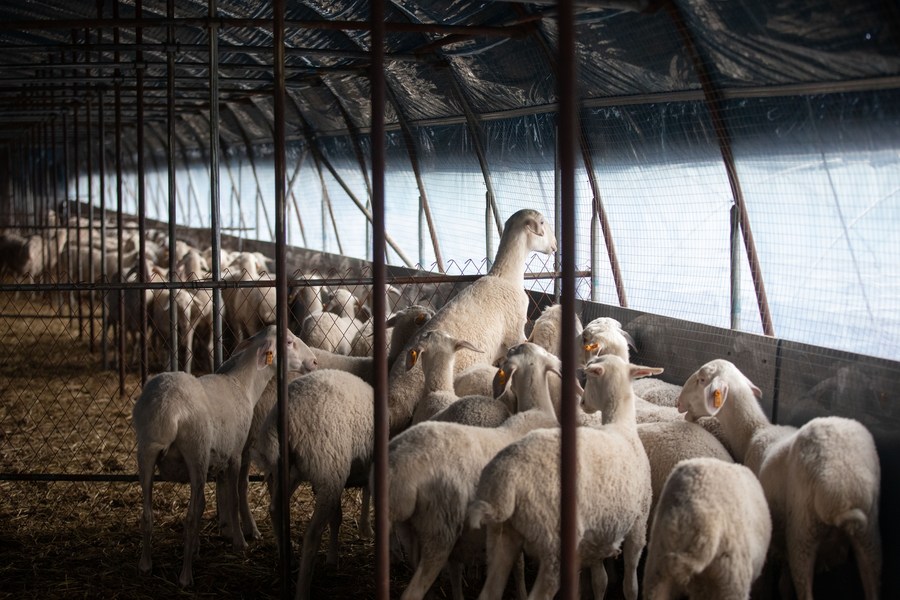
Sheep are seen at a breeding demonstration area of Heilongjiang Yichun forest industry Refco Group Ltd in Yichun, northeast China's Heilongjiang Province, May 20, 2023. (Xinhua/Zhang Tao)
YICHUN: "ASK THE FOREST FOR FOOD"
A city abundant in forest resources, Yichun was once an important supplier of timber in China and has a history of more than 60 years of forest exploitation.
To restore the ecosystem, Yichun completely banned commercial logging in 2013. After that, Yichun began to "ask the forest for food" by developing eco-tourism, forest food and medicine industries, and specialty breeding industries such as edible fungi, small berries and forest pigs.
Chi Tianqi, a 37-year-old local, manages a husbandry company that raises sheep. While straw, bean pulp and forest grass is used to feed the sheep, the animals' waste is utilized as manure for wood plantation and agricultural production.
"Compared with my father's generation, who lived on timber harvesting only, we now have more choices with the development of the non-timber forest-based economy," said Chi.
Nowadays, Yichun has expanded its protection of forest trees and woodlands to systematic protection of mountains, waters, forests, farmlands, lakes, grasslands and wildlife.
A set of data witnessed the ecological change of Yichun -- the city's forest stock volume has reached 375 million cubic meters, with an average annual net increase of more than 10 million cubic meters, while its forest coverage rate has reached 83.8 percent.
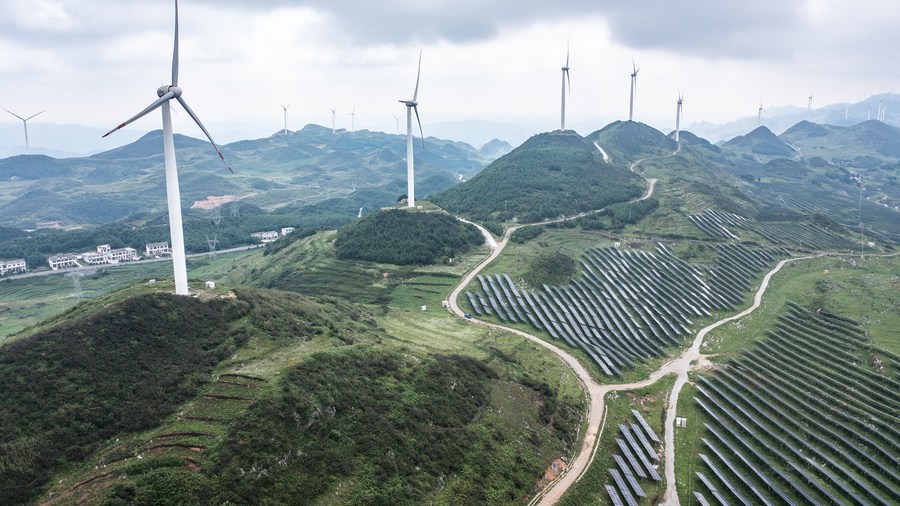
This aerial photo taken on July 6, 2023 shows a photovoltaic (PV) power plant in Ertang Town of Weining Yi, Hui and Miao Autonomous County, southwest China's Guizhou Province. (Xinhua/Tao Liang)
WEINING: "TOWN OF SUNSHINE"
As the county with the highest average altitude in Guizhou Province, Weining was once one of the most impoverished areas in the southwestern province due to unfavorable conditions for agriculture.
Its development dilemma was not solved until local people decided to capitalize on its geographical advantage given it had long been known as the province's "town of sunshine."
In 2011, the first wind power station was built in Weining. Since then, more new energy power projects have been put into operation in the county, with solar and wind power now accounting for over 93 percent of its electricity generation.
Nowadays, the town has become a perfect place for cultivating the new energy industry, which has produced both economic and ecological rewards.
In 2021, 5.4 billion kilowatt-hours of electricity was generated by Weining, which uses only 1.5 billion kilowatt-hours annually.
Solar power development not only contributes to carbon reduction, like other forms of new energy industries do, but also helps conserve soil and water in the mountainous region.
"The photovoltaic panels block the sunlight and reduce water evaporation, so the vegetation on the project site grows better," said Tian Haokun, operator of a local photovoltaic power project.
More places like Weining are marching on the path of green development as authorities have vowed to maintain harmony between humanity and nature when planning the country's development.
China is seeing greater synergy between green transformation and economic growth, said Fu Linghui, a spokesperson with the National Bureau of Statistics, who cited double-digit growth in the output and export of green products, such as new energy vehicles and solar batteries, in the country in the first five months of 2023.
"In promoting green transformation, we have fostered not only a better environment but also new growth drivers in the economy," Fu said. ■

